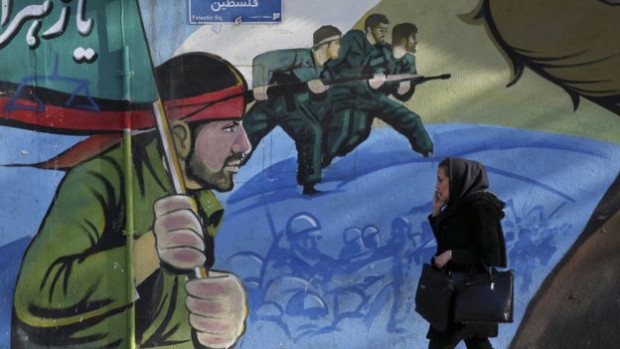Iran turns new leaf as sanctions lifted
BBC
Iran “has opened a new chapter” in its ties with the world, President Hassan Rouhani said, hours after international nuclear sanctions were lifted.
The move came after the international nuclear watchdog, the IAEA, said Iran had complied with a deal designed to prevent it developing nuclear weapons.
UN, US and EU sanctions have hit Iran hard for years.
Most Western governments hailed the move but Israel accused Tehran of still seeking to build a nuclear bomb.
“Without an appropriate reaction to every violation, Iran will realise it can continue to develop nuclear weapons, destabilise the region and spread terror,” Israeli Prime Minister Benjamin Netanyahu said.
US Republican House Speaker Paul Ryan said the Obama administration had moved to lift economic sanctions “on the world’s leading state sponsor of terrorism”.
Before the deal, Iran could have enriched enough uranium to make a nuclear bomb within a matter of weeks, had it so wanted, says the BBC’s Bethany Bell in Vienna.
Now it would take more than a year and it is something international inspectors would see, she says.
Sanctions on Iran

Nuclear sanctions have been in place since 2006, on top of other sanctions stretching back decades:
- The economic sanctions being lifted now were imposed progressively by the US, EU and UN in response to Iran’s nuclear programme
- The EU is lifting in full restrictions on trade, shipping and insurance
- The US is suspending, not terminating, its nuclear-related sanctions; crucially, Iran can now reconnect to the global banking system
- The UN is lifting sanctions related to defence and nuclear technology sales, as well as an asset freeze on key individuals and companies
- Non-nuclear US economic sanctions remain in place, notably the ban on US citizens and companies trading with Iran, and US and EU sanctions on Iranians accused of sponsoring terrorism remain in place
- A flurry of Iranian economic activity is anticipated:
- Nearly $100bn (£70bn) of Iranian assets are being unlocked
- Iran is expected to increase its daily export of 1.1m barrels of crude oil by 500,000 shortly, and a further 500,000 thereafter
- Iran is reportedly poised to buy 114 new passenger planes from the Airbus consortium
Mr Rouhani said everyone was happy with the deal, apart from those he described as warmongers in the region – Israel and hardliners in the US Congress.
“We Iranians have reached out to the world in a sign of friendliness, and leaving behind the enmities, suspicions and plots, have opened a new chapter in the relations of Iran with the world,” he said in a statement to the nation on Sunday morning.
The lifting of sanctions was “a turning point” for Iran’s economy, he added, saying the country needed to be less reliant on oil revenues.
The prospect of Iran doubling its crude oil exports has contributed to the continuing fall in the oil price. Benchmark Brent crude closed below $29 (£20.3) on Friday.
Share prices in Saudi Arabia, the Arab world’s largest stock market, fell more than 6% following the lifting of sanctions. Markets Qatar and Dubai also opened down 6% on Sunday.
EU foreign policy chief Federica Mogherini said Iran’s compliance and the lifting of sanctions would contribute to improved regional and international peace and security.

Yukiya Amano, the head of the IAEA, will visit Tehran on Sunday for talks on how to continue monitoring Iran’s nuclear programme.
The IAEA said it had installed a device at the Natanz plant to monitor Iran’s uranium enrichment activities in real time, in order to verify that uranium enrichment levels were kept at up to 3.67% as agreed in the deal with world powers.
As part of the deal, Iran had to drastically reduce its number of centrifuges and dismantle a heavy-water reactor near the town of Arak, both of which could be used in creating nuclear weapons.
Earlier on Saturday it emerged that Iran had released Washington Post reporter Jason Rezaian and three other Iranian-American prisoners in an apparent prisoner swap with the United States.
Rezaian, 39, was jailed on charges, including espionage, last November.
The Washington Post said it was still waiting for details of Rezaian’s release as the other prisoners’ families waited for further news.
The US said it was offering clemency to seven Iranians being held in the US for sanctions violation.
A fifth American, Matthew Trevithick, was also released on Saturday.
Iran has always maintained its nuclear programme is peaceful, but opponents of the deal – such as some US Republicans – say it does not do enough to ensure the country cannot develop a nuclear bomb.
How to submit an Op-Ed: Libyan Express accepts opinion articles on a wide range of topics. Submissions may be sent to oped@libyanexpress.com. Please include ‘Op-Ed’ in the subject line.
- Libya’s HCS invites applicants for key state roles - December 31, 2023
- UK calls on Iran to prevent escalation in Israel-Hamas conflict - November 05, 2023
- Libyan Interior Minister: Immigrant shelter costs a fortune - November 05, 2023


